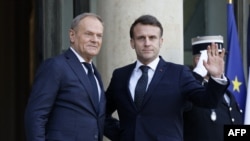European leaders called for beefing up their defense spending Monday after a Paris summit on Ukraine and the region's security — amid concerns about an aggressive Russia and declining support from Washington. The emergency meeting comes ahead of U.S.-Russian talks on ending the war in Ukraine — which it appears could leave out the Europeans.
The summit, called by French President Emmanuel Macron, came as Europeans confront a shift in transatlantic relations under the new administration U.S. President Donald Trump.
European Commission chief Ursula von der Leyen said European security was at a “turning point.”
Ahead of the Paris talks — gathering European Union, NATO and British leaders — Polish Prime Minister Donald Tusk described efforts to introduce competition between the European Union and the United States as senseless and potentially dangerous.
Ian Lesser, who heads the Brussels office of the German Marshall Fund policy institute, said there are two big issues on the agenda for European leaders in the near term.
“It’s all about what can be done for and with Ukraine, in anticipation of the United States doing less, and possibly in anticipation of having to guarantee a settlement or at least a ceasefire,” Lesser said.
“The other long-term question, which is some ways more serious, is how to secure Europe’s defense with the United States potentially absent in the years to come And there, I think, there’s very little consensus, and it’s a very big and expensive and long-term project for Europe.”
Top U.S. and Russian officials were to hold talks Tuesday in Saudi Arabia to discuss Ukraine and a possible summit between President Donald Trump and his Russian counterpart, Vladimir Putin. Neither Ukraine nor the Europeans have been invited.
British Prime Minister Keir Starmer said his country is willing to send troops to Ukraine as part of any peace deal. Other European leaders say that’s premature. Meanwhile, the foreign minister of Hungary, which is close to both Russia and the Trump administration, said the Paris talks undermine peace.
Leaders in Paris also discussed ways to rapidly increase Europe’s own defense capabilities and support for Ukraine.
“Increased spending at home, increased defense production, increased sizes of armies, increased intelligence cooperation, increased training — all of this is to happen, in addition to supplying Ukraine so its front line doesn’t collapse,” said Orysia Lutsevych, head of the Ukraine Forum at the Chatham House think tank in London.
She described a key security conference in Munich last week, which left Europe concerned about Washington’s new priorities, as a wake-up call.
“It’s a different White House and a different team,” she said. “And Europe was slow to realize that and to find the right words and the right package for this transactional world of America.”
The U.S. has long pushed Europe to do more for its own defense. Now — with Russia gaining the advantage on the ground in Ukraine, and Washington calling for NATO members to increase military budgets — Europeans are sensing an urgency to do so.




